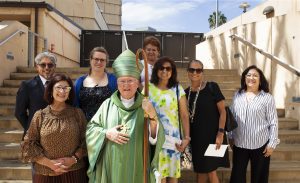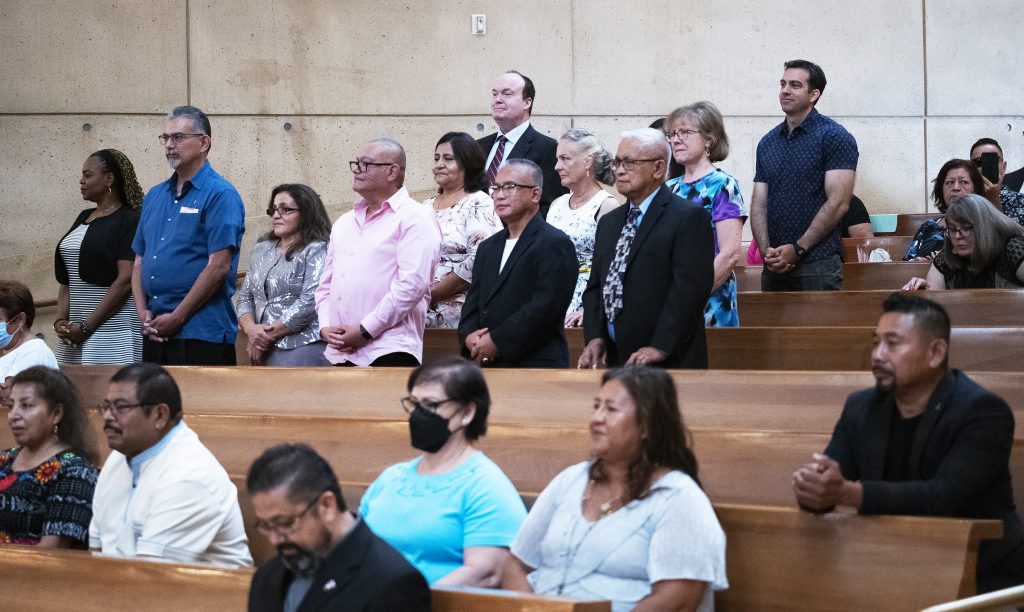Kenneth Arguelles has been a catechist in the Archdiocese of Los Angeles for more than 20 years. But in the process of learning how to teach others, he’s learned a lot more about himself.
The 60-year-old parishioner of St. Mary’s Church in Palmdale was part of a group of certified catechists officially commissioned last month at the Cathedral of Our Lady of the Angels following four years of studies at Loyola Marymount University and the Catholic Bible Institute.
His mission as a catechist is a busy one, now including Bible study on Thursday nights on Zoom; Order of Christian Initiation of Adults (OCIA) classes on Monday nights; and first Communion classes on Wednesday nights.
“My spirituality is much more developed and life has more joy in it today because of the gifts I received from our Church as a certified catechist,” said Arguelles, who by day works for the Los Angeles County Assessor’s office as a real property appraiser in the Antelope Valley.
Arguelles traces his vocation as a catechist back to an encounter more than 20 years ago with Flor de Maria Luna, then the director of religious education at St. Mary’s and now catechist formation coordinator for the entire archdiocese.
Arguelles was first certified as a catechist in 2006, then as a master catechist in 2019 following a three-year formation program. Today, he’s part of a team that meets on Saturdays to develop certified catechists in the Antelope Valley and the rest of the San Fernando Pastoral Region.
Not all are officially certified, since pastors ultimately decide how catechesis is given and who gives it in each parish. The Catechist Formation Ministry estimates that about 95% of the more than 1,500 active catechists in the archdiocese are female. The average catechist age is about 55.
Luna admitted the recent pandemic saw a notable number of older catechists decide to step back from ministry work. Connecting catechists with children, teens, adults, and new converts across various programs became more difficult.
But following the worst of the pandemic, Luna said her office is working to identify people’s needs and “ways to accompany them.”

Giovanni Perez, the archdiocese’ coordinator of catechistic formation in Spanish for the last 10 years and a catechist for 30 years, sees not only a need for new English and Spanish-speaking catechists, but also those in Korean, Chinese, and Vietnamese, plus a growing population of indigenous Mayan communities.
“I remember the first message that Pope Francis sent in 2020 — from a crisis like a pandemic, one comes out either better or worse, but we’re not the same,” said Perez, who lives in Whittier and attends Dolores Mission Church in Boyle Heights.
“We as a Catholic community in general are coming out much better equipped to address the needs of the people in the 21st-century reality. Technology is only one part of it. The whole paradigm has changed. It has asked that families be more involved.”
But when it comes to the technology part, the pandemic seems to have inspired some fresh creativity in catechists like Monalisa Hasson. The catechist at St. Joseph’s Church in Hawthorne who taught in public schools for 30 years, she created a free website (GoodNewsCatechist.com ) to help fellow catechists get on board with simple things like lesson planning.
“I struggled so much at the beginning I thought it would be good to create a clearinghouse of resources,” said Hasson.
She recently completed two faith formation and catechist preparation programs offered through the archdiocese: One Faith, One Mission (OMOF) and Vision and Skills for Faith Formation (VSFF). Now back in the classroom for the second year in a row, she sees COVID as an event that unexpectedly “brought us together to meet each other’s needs through unconventional means.
“Zoom helped me engage more with parents, to chat about things they were facing,” said Hasson.
But Hasson believes the effects of pandemic-induced isolation on young people — apprehension, hesitancy, social awkwardness — calls for catechists to spend more time in the “pre-evangelization stage of getting to know our students.”
“In many ways, I believe we have to take a step back from teaching facts to learning about our students in order to activate an interest in learning about Jesus with the heart, mind, and soul,” she said. “This becomes the true evangelization.”
Likewise, Ernesto Vega, coordinator for adult faith formation in Spanish, sees “pros and cons” to the consequences of the pandemic on religious education.
“We just had to keep figuring out how we as a ministry could keep making things interesting by virtual means,” said Vega. “That includes, in that spirit of missionary discipleship, to build bridges with the pastors and brother priests so we become one larger team.”
Vega has found using Facebook and Instagram effective in recruiting new catechists on the parish level, but an overwhelming percentage come through personal relationships that lead to recommendations by a friend or a pastor.
As Luna outlined in a recent essay on AngelusNews.com, it is those personal relationships that in turn form the true foundation of effective catechesis.
“The programs feel more like retreats than ‘educational’ learning,” said Cara Crosetti, business manager and coordinator for adult initiation formation at Our Lady of Sorrows in Santa Barbara. “I have learned so much about how God speaks to us in our day, how to connect with him at a deeper level and how to share this with others.”
Crosetti, who received OMOF certification in 2021 and is now in the Advanced Ministry Studies program, said she’d recommend the archdiocese’s programs to anyone considering the calling to be a catechist.
“I think we need more catechists in our world, and this is a call to all who love their faith and seek to share it,” said Crosetti. “Every religious education program needs someone and you’ll find your love for Our Lord will grow more deeply by sharing it with others.”

